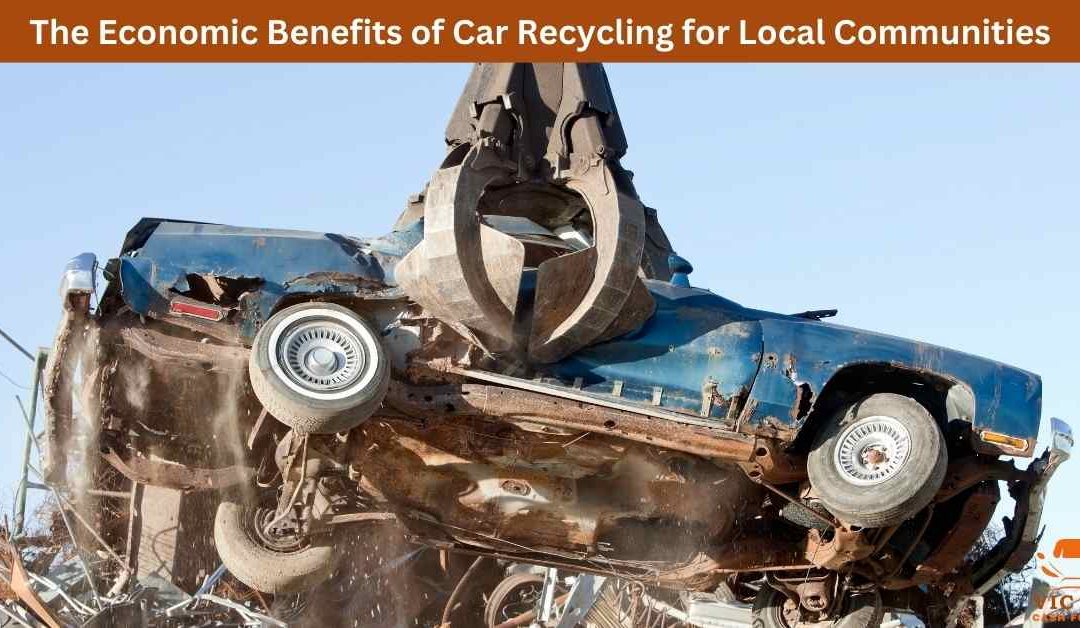Car recycling is an essential process that not only helps in preserving the environment but also offers significant economic benefits to local communities. By recycling vehicles, communities can create jobs, reduce waste, and support local businesses, all while contributing to a more sustainable future. In this blog, we’ll explore the various ways in which car recycling positively impacts the local economy and why it’s an important practice for communities to embrace.
1. Job Creation
One of the most direct economic benefits of car recycling is the creation of jobs. The recycling industry requires a diverse range of workers, from skilled laborers who dismantle vehicles to administrative staff who manage operations. These jobs provide employment opportunities for local residents, boosting the community’s overall economic health.
a. Employment Opportunities
Car recycling facilities hire workers for various roles, including mechanics, metalworkers, environmental specialists, and logistics personnel. These jobs often require specialized skills, offering stable employment and opportunities for career growth.
b. Indirect Job Creation
In addition to direct employment, car recycling supports indirect job creation in related industries, such as transportation, manufacturing, and retail. For example, companies that supply tools, equipment, and services to recycling facilities also benefit from the industry’s growth, further contributing to local job creation.
2. Supporting Local Businesses
Car recycling fosters the growth of local businesses by creating demand for various goods and services. From towing companies to parts suppliers, many small businesses benefit from the car recycling industry, helping to strengthen the local economy.
a. Supply Chain Benefits
Recycling facilities often rely on local suppliers for materials, tools, and services, creating a supply chain that benefits multiple businesses within the community. This interconnectedness helps keep money circulating within the local economy, supporting the growth of small businesses.
b. Boosting the Automotive Industry
The recycled parts and materials recovered from vehicles can be sold to local automotive repair shops and manufacturers, providing them with affordable resources. This not only helps these businesses reduce costs but also makes it easier for consumers to find affordable replacement parts, supporting the overall health of the local automotive industry.
3. Environmental Savings
Car recycling significantly reduces the environmental impact of vehicle disposal, which in turn has economic benefits for local communities. By minimizing waste and pollution, communities can avoid costly environmental clean-up efforts and promote a healthier living environment.
a. Reducing Landfill Waste
Recycling cars prevents millions of tons of waste from ending up in landfills. This reduction in waste helps communities save on landfill management costs and reduces the need for expanding landfill sites, which can be both expensive and environmentally damaging.
b. Lowering Pollution and Health Costs
Recycling cars reduces the release of harmful pollutants into the environment, such as oil, coolant, and other hazardous substances. By protecting local ecosystems and water sources, communities can avoid the high costs associated with environmental remediation and healthcare expenses related to pollution-induced health problems.
4. Revenue Generation
Car recycling generates revenue for local governments and communities through taxes, fees, and the sale of recycled materials. This revenue can be reinvested into public services, infrastructure, and community development projects, further enhancing the local economy.
a. Scrap Metal Sales
One of the most valuable aspects of car recycling is the recovery of scrap metal. Metals like steel, aluminum, and copper are extracted from vehicles and sold to metal recycling companies, generating significant revenue. This not only supports local businesses but also contributes to the global supply of recycled metals, reducing the need for mining and preserving natural resources.
b. Tax Revenue
Recycling facilities and the businesses that support them contribute to the local tax base through property taxes, sales taxes, and income taxes. This tax revenue can be used to fund essential community services such as education, healthcare, and public safety, benefiting all residents.
5. Promoting Economic Sustainability
Car recycling plays a key role in promoting economic sustainability by reducing reliance on finite resources and encouraging the use of recycled materials. This sustainable approach helps communities build resilient economies that can adapt to changing economic and environmental conditions.
a. Conserving Resources
By recycling vehicles, communities can reduce the demand for new raw materials, such as iron ore and petroleum, which are used in the production of new vehicles. This conservation of resources helps stabilize prices and ensures that these materials remain available for future generations.
b. Encouraging Innovation
The car recycling industry is constantly evolving, with new technologies and practices being developed to improve efficiency and environmental outcomes. This drive for innovation can lead to the creation of new businesses and industries within the community, further diversifying and strengthening the local economy.
6. Enhancing Community Well-being
Finally, car recycling contributes to the overall well-being of the community by promoting environmental stewardship and fostering a sense of responsibility among residents. When communities prioritize recycling, they send a message that they value sustainability and are committed to protecting their environment for future generations.
a. Community Engagement
Recycling initiatives often involve community education and engagement efforts, encouraging residents to participate in environmentally responsible practices. This can lead to greater community cohesion and a shared commitment to sustainability.
b. Long-Term Economic Health
By embracing car recycling, communities can lay the groundwork for long-term economic health. Sustainable practices like recycling ensure that the community’s resources are managed wisely, reducing the risk of economic instability due to resource depletion or environmental degradation.
Conclusion
The economic benefits of car recycling for local communities are substantial and far-reaching. From job creation and support for local businesses to environmental savings and revenue generation, car recycling offers a sustainable path to economic growth. By choosing to recycle vehicles, communities can build stronger, more resilient economies while also contributing to a healthier planet. As we move toward a more sustainable future, the role of car recycling in local economies will only continue to grow in importance.
If you are in Mentone, Victoria 3194, and looking for cash for cars Melbourne service, this is the best way to visit us.
VIC Top Cash For Cars
2 Rochford Pl, Narre Warren South VIC 3805
(03) 7035 7828


Recent Comments